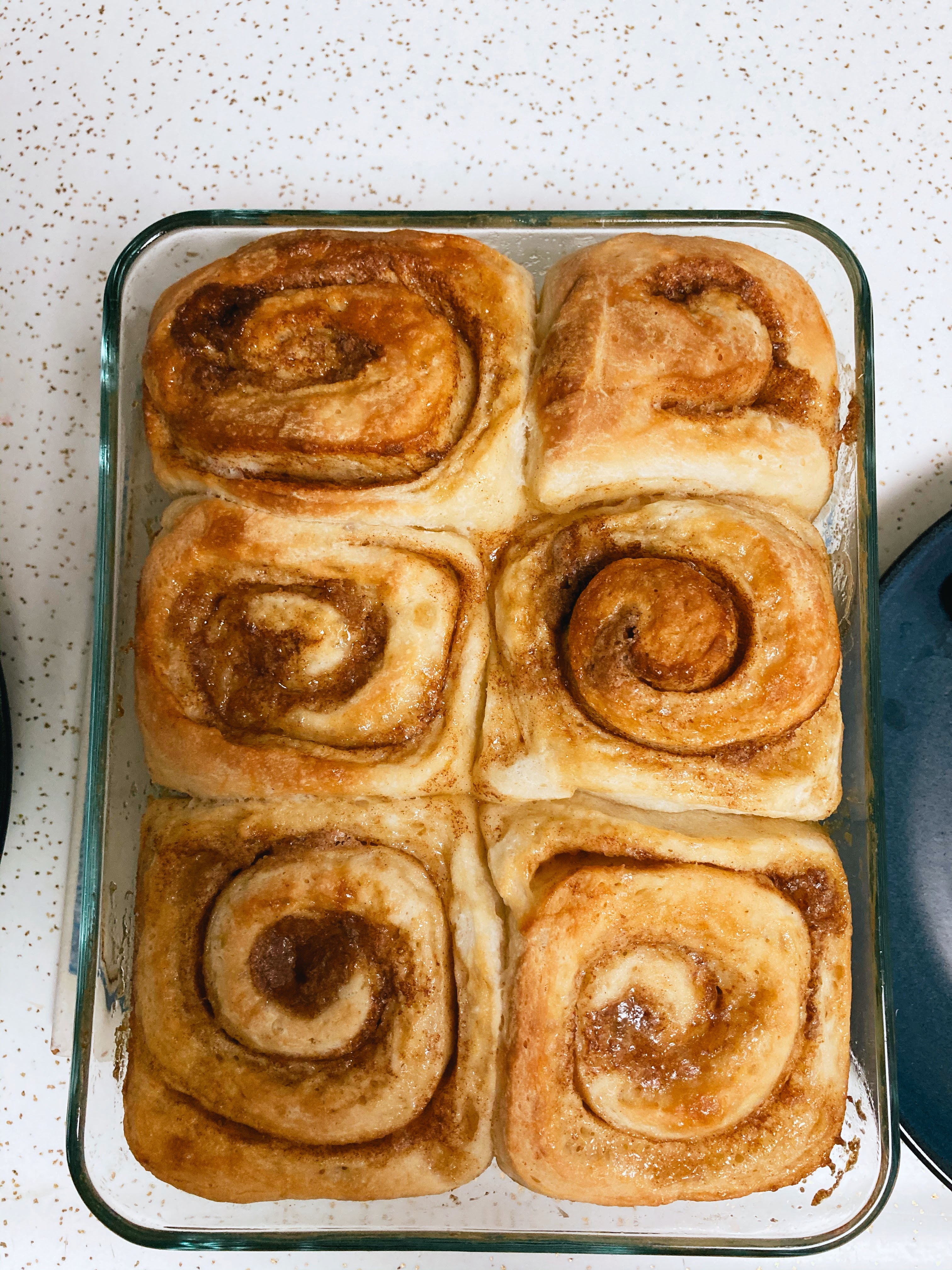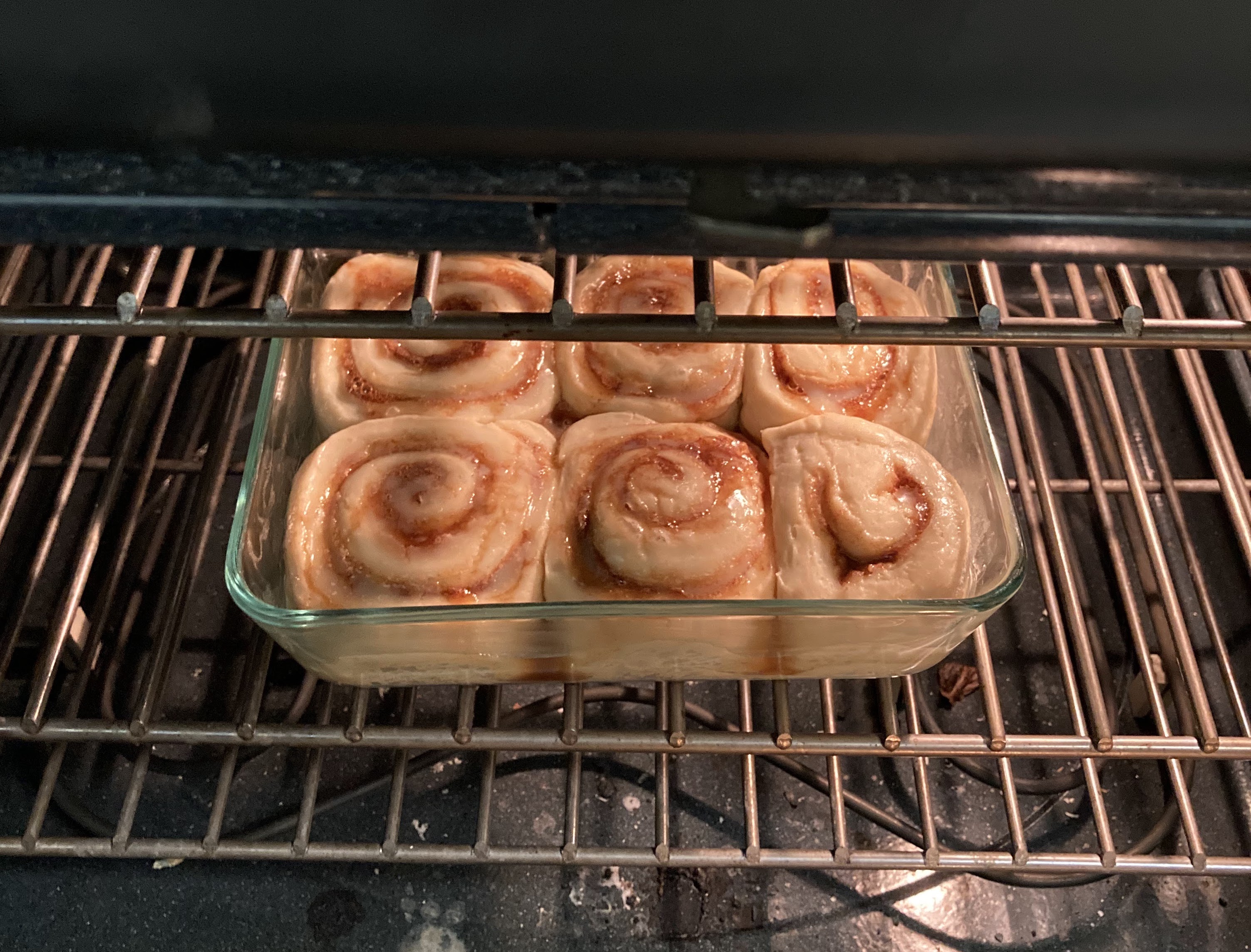Content from Sourdough Cinnamon Roll Introduction
Last updated on 2026-02-03 | Edit this page
Overview
Questions
- Why should you make sourdough cinnamon rolls?
Objectives
- Describe the overall appeal of sourdough cinnamon rolls
- Understand if this is the right recipe for you
We will be describing Little Spoon Farm’s delicious sourdough cinnamon roll recipe. The sourdough imparts a slightly tangy, fruity quality that complements the cinnamon flavor of the rolls. However, it does take slightly more work and time than a standard cinnamon roll recipe that uses dry yeast. Additionally, you’ll need to have some sourdough starter already going; alternatively, you can pester a friend for some of theirs, or make your own.

Content from Cinnamon Roll Ingredients
Last updated on 2026-02-03 | Edit this page
Overview
Questions
- What are the ingredients needed for the cinnamon rolls?
Objectives
- Be able to put together your shopping list
- Convert between metric and imperial units, if necessary
- Double the recipe if you’re really hungry
Ingredients
There are 3 main components to this recipe: the main ingredients for the dough, the ingredients for the cinnamon-sugar filling, and the ingredients for the glaze.
Dough Ingredients
R
main_ingredients <- tribble(
~ingredient, ~amount_imperial, ~amount_grams,
"butter (cold)", "8 tablespoons", 113,
"all-purpose flour", "2 ½ cups", 300,
"sourdough starter discard", "⅓ cup", 100,
"buttermilk", "1 cup", 240,
"honey or granulated sugar", "1 tbsp + 1 tsp", 25,
"fine sea salt", "¾ teaspoon", 4,
"baking powder", "1 tsp", NA,
"baking soda", "½ cup", NA)
main_ingredients %>%
kableExtra::kable(align = "r")
| ingredient | amount_imperial | amount_grams |
|---|---|---|
| butter (cold) | 8 tablespoons | 113 |
| all-purpose flour | 2 ½ cups | 300 |
| sourdough starter discard | ⅓ cup | 100 |
| buttermilk | 1 cup | 240 |
| honey or granulated sugar | 1 tbsp + 1 tsp | 25 |
| fine sea salt | ¾ teaspoon | 4 |
| baking powder | 1 tsp | NA |
| baking soda | ½ cup | NA |
Recipe modifications:
You can use active sourdough starter instead of discard, if you so choose. There will be a slight modification to the recipe if that is the case.
In warmer climates, you may want to reduce the amount of buttermilk and/or increase the amount of flour to produce a less sticky, more manageable dough. You may have to experiment a bit.
Cinnamon-sugar filling
R
filling_ingredients <- tribble(
~ingredient, ~amount_imperial, ~amount_grams,
"light brown sugar", "¾ cup", 150,
"ground cinnamon", "2 teaspoons", NA,
"butter (melted)", "4 tablespoons", 56)
filling_ingredients %>%
kableExtra::kable(align = "r")
| ingredient | amount_imperial | amount_grams |
|---|---|---|
| light brown sugar | ¾ cup | 150 |
| ground cinnamon | 2 teaspoons | NA |
| butter (melted) | 4 tablespoons | 56 |
Glaze
R
glaze_ingredients <- tribble(
~ingredient, ~amount_imperial, ~amount_grams,
"powdered sugar", "1 cup", 120,
"butter (melted)", "1 tablespoon", 14,
"vanilla extract", "1 teaspoon", 5,
"milk", "2 tablespoons", 30)
glaze_ingredients %>%
kableExtra::kable(align = "r")
| ingredient | amount_imperial | amount_grams |
|---|---|---|
| powdered sugar | 1 cup | 120 |
| butter (melted) | 1 tablespoon | 14 |
| vanilla extract | 1 teaspoon | 5 |
| milk | 2 tablespoons | 30 |
Challenge
Add a column to main_ingredients that has the amount in
ounces (weight, not fluid oz).
R
main_ingredients <- main_ingredients %>%
mutate(amount_oz = amount_grams * 0.035274)
main_ingredients
OUTPUT
# A tibble: 8 × 4
ingredient amount_imperial amount_grams amount_oz
<chr> <chr> <dbl> <dbl>
1 butter (cold) 8 tablespoons 113 3.99
2 all-purpose flour 2 ½ cups 300 10.6
3 sourdough starter discard ⅓ cup 100 3.53
4 buttermilk 1 cup 240 8.47
5 honey or granulated sugar 1 tbsp + 1 tsp 25 0.882
6 fine sea salt ¾ teaspoon 4 0.141
7 baking powder 1 tsp NA NA
8 baking soda ½ cup NA NA Content from Baking Instructions
Last updated on 2026-02-03 | Edit this page
Overview
Questions
- How do you prepare the sourdough cinnamon rolls?
Objectives
- Be able to produce a batch of delicious cinnamon rolls
- Understand how to adjust proofing time
The Night Before
Mix the dough:
- Use a box grater to shred the cold butter into a large mixing bowl.
- Add the flour to the bowl and use a fork, bench scraper, or pastry cutter (if you have one) to cut the butter into the flour.
- Add the sourdough starter discard, buttermilk, honey and salt.
- Use a spatula or wooden spoon to mix until the ingredients are well incorporated.
- Cover the bowl and let it rest for 10-12 hours, depending on the temperature of your kitchen (more time for cooler kitchens, less time for warmer ones).
The Next Morning
Make cinnamon sugar filling and glaze:
- Mix the brown sugar and cinnamon in a small bowl.
- In a separate bowl, mix the glaze ingredients.
- Preheat oven to 375°F (190°C) and butter a 12” cast iron skillet or deep baking container (glass or enamel will work just fine).
Add leavening agents to dough:
If using active sourdough starter, skip this step.
- Use a fork to mix the baking powder and baking soda in a small bowl until they are evenly mixed with no clumps.
- Sprinkle the mixture evenly on top of the dough and use your hands to mix it in, distributing it evenly throughout the dough.
Roll out the dough:
- Flour your work surface generously and tip the dough out of the bowl onto it.
- Sprinkle flour across the top of the dough.
- Use a rolling pin to roll the dough into a roughly 12” x 24” (30cm x 61cm) rectangle, which should be about 1/4” (0.5cm) thick.
Cut out rolls:
- Use a pastry brush to coat the top of the dough with melted butter. If you don’t have a pastry brush, you can drizzle it and use a finger to spread it somewhat evenly.
- Sprinkle the cinnamon-sugar mixture evenly over the surface of the rolls so that it sticks to the melted butter, leaving a half inch (1cm) bare along the edges.
- Starting on one of the long sides of the rectangle, roll the dough into a log shape, so the log is about 24” (61cm) long
- Use the bench scraper or a knife to cut the log into 12 pieces, approximately 2 inches (5cm) long.
- Arrange the pieces in the baking vessel so the “swirls” are upright, leaving space in between each piece so they can expand while baking.
Bake:
- Bake the cinnamon rolls for 35-40 minutes or until the tops show a nice golden-brown color.
- Remove from the oven and drizzle glaze over the rolls while they are still hot.
 A batch
of cinnamon rolls partway through baking, wafting a very tempting aroma
throughout the kitchen.
A batch
of cinnamon rolls partway through baking, wafting a very tempting aroma
throughout the kitchen.
